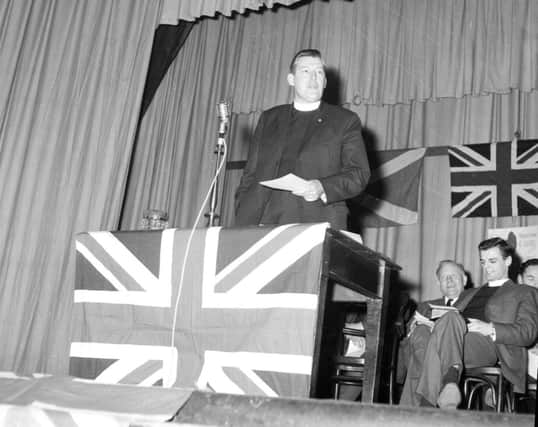Leader: Ian Paisley legacy


One of the most mortal of foes at the extremes of the bitterest of sectarian divides, Mr McGuinness said: “I have lost a friend.”
To those in mainland Britain who only watched from a distance as Northern Ireland was torn apart in three decades of the bloody, murderous civil war that became euphemistically known as “the Troubles”, such a friendship seems impossible to comprehend.
Advertisement
Hide AdAdvertisement
Hide AdFor most of their lives, nothing united them except that they both inhabited the same patch of earth which Mr Paisley fervently believed was ordained to be a Protestant part of the United Kingdom and which Mr McGuinness, equally zealously, believed should be part of Catholic Ireland.
Mr Paisley’s booming voice that needed no megaphone to be heard at a distance became synonymous with hardline uncompromising Ulster Unionism defined by the phrases that peppered his speeches – never, no surrender, and not an inch. Since he was defending a hegemonistic Unionism that deprived Ulster’s minority Catholics of their civil rights, he was not admired outside Unionist ranks.
And when the struggle for civil rights turned into civil war as Irish Republicans concluded that what could not be won at the ballot box could only be secured by bombs and bullets, it was his voice that inspired many Unionists to take up the gun against Irish Republicanism. In that Republican movement, Mr McGuinness was in the shadows, rising to become a senior figure in the Provisional IRA.
Both did their bit to destroy all attempts at reconciliation and a peaceful settlement until 1998, when Mr McGuinness and other IRA leaders recognised victory was impossible and Mr Paisley believed that the IRA had been effectively defeated. Even so, Mr Paisley evidently only felt secure in that judgment when his Democratic Unionist Party out-manoeuvred the more moderate Ulster Unionist Party to become Ulster’s dominant political party.
Then the miracle happened. The Unionist lion sat down with the Republican dragon and… got on with each other. Mr Paisley became First Minister of the re-created assembly and Mr McGuinness became Deputy First Minister. They didn’t just get on, they laughed with each other and became friends.
Quite a few in Ulster cannot bring themselves to be as reconciliatory as Mr McGuinness, blaming Mr Paisley’s intransigence for prolonging the conflict and for inspiring some to take up the gun. But viewed in another light, it was his very intransigence and political heft that ensured the Unionist community adhered to the Good Friday agreement. That, in turn, assured Republicans. It is an extraordinary political career and an extraordinary legacy.
A very British reaction
Given all the human horrors that are happening in the world – near-war in Ukraine, mayhem in Syria and Iraq, a terrifying epidemic in west Africa – the reaction to a fire in a Manchester dogs’ home that has killed about 60 animals is quite remarkable.
The fire broke out on Thursday evening and was extinguished by the fire brigade as about three-quarters of the home’s dogs were rescued. That so many animals died is sad, but on the scale of
Advertisement
Hide AdAdvertisement
Hide Addistressing events, there are many which are rather more tragic.
Yet all day, the wrecked home has seen a stream of people turning up and asking what they can do to help.
Even more remarkably, more than £800,000 has been donated to help the home recover and rebuild even though, presumably, insurance should cover most of the costs. Some would surely contend that people have got their priorities wrong.
It would be trite to respond that it demonstrates the great British affection for dogs as man’s best friend. This seems to have touched a deeper chord. Part of it may be that the home is regarded locally as part of the community, looking after thousands of unwanted and abandoned animals.
Part of it may also be the circumstances in which they died – trapped in the building that was intended to keep them safe and unable to escape the flames. Nearby residents would have heard the piteous howling, which surely would have touched the hardest of hearts.
It adds up to demonstrating something which is not an eccentricity, but an essential part of the British character – intuitive sympathy for, and a willingness to help, the helpless, even if they are just dogs.